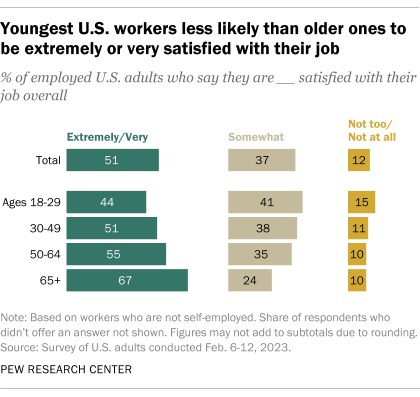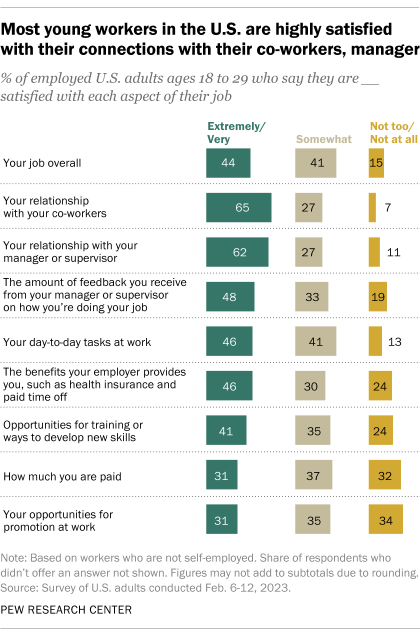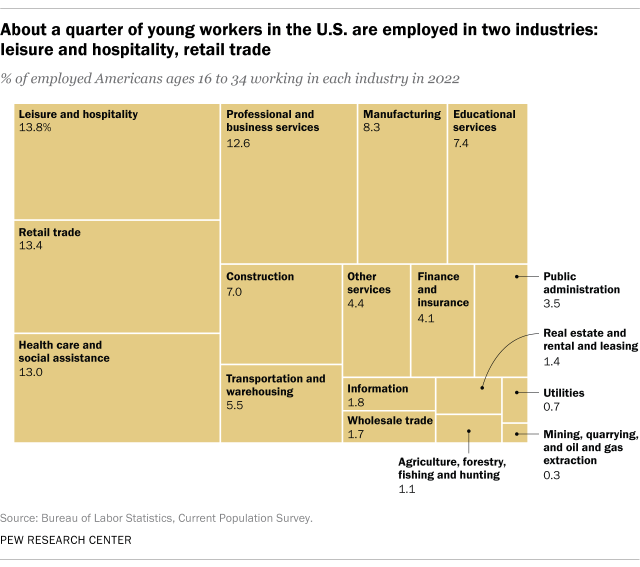From a COVID-19-era trend of “quiet quitting” to the rise of the #quittok hashtag on TikTok, young workers in the United States have reportedly grown disengaged from their jobs and traditional “hustle culture.” But while young workers are less likely than their older counterparts to express the highest levels of job satisfaction, most (85%) are at least somewhat satisfied with their job overall, according to a recent Pew Research Center survey.

Older workers offer especially positive assessments of their job. Among those who are not self-employed, U.S. workers ages 50 to 64 (55%) and 65 and older (67%) are significantly more likely than young workers ages 18 to 29 (44%) to say they are extremely or very satisfied with their job overall. Mid-career professionals also express more positive views than young workers: About half (51%) of those ages, 30 to 49 say they’re extremely or very satisfied with their job.
Still, young workers express general contentment with many aspects of work that the survey asked about, such as their relationships with colleagues and their daily assignments.

Personal connections stand out as the highest-rated measures of job satisfaction among young workers: About two-thirds of employed adults ages 18 to 29 (65%) say they’re extremely or very satisfied with their relationship with their co-workers, and 62% say the same about their relationship with their manager or supervisor.
A substantial share of young workers (46%) say they are extremely or very satisfied with their day-to-day tasks at work, while the same share says this about the benefits their employer provides, such as health insurance and paid time off. And about four in ten (41%) are highly satisfied with the opportunities for training or ways to develop new skills at their workplace.
Young workers are more evenly split on other factors, such as their compensation. They are about as likely to say they’re extremely or very satisfied with their pay as they are to say they’re not too or not at all satisfied with it (31% vs. 32%). The group is similarly divided in their satisfaction with the opportunities for promotion at their workplace.
While workers across all age groups are about equally likely to express high satisfaction with their benefits and training opportunities, young workers are less likely than those ages 50 to 64 and 65 and older to say the same about other aspects of work asked about in the survey – like their pay and day-to-day tasks.
How young workers describe their job and its impact on their personal identity
Young workers are more likely than older ones to describe their job in negative terms, but many young workers also say their job is enjoyable and important to them.
For example, about three-in-ten employed U.S. adults ages 18 to 29 (32%) say they find their job stressful all or most of the time, compared with a quarter of employed adults ages 50 to 64 and 19% of those 65 and older. (Workers ages 18 to 29 are as likely as those 30 to 49 to say their job is stressful all or most of the time.) Nearly a quarter (23%) of workers ages 18 to 29 also say they find their job overwhelming all or most of the time, compared with 15% of workers 50 to 64 and 14% of those 65 and older.
Still, about four in ten or more young workers find their job enjoyable (44%) or fulfilling (39%) all or most of the time. And they largely believe their efforts at work are valued: About six-in-ten (59%) say their contributions are valued a great deal or a fair amount, while 28% say their contributions are valued some. Just 12% say they’re not valued much or at all.
A majority of young workers ages 18 to 29 also say their job helps shape their sense of self, but they lack consensus on how important it is in this regard: 37% say their job or career is extremely or very important to their overall identity, while 33% say it’s somewhat important. About three-in-ten (31%) say their job is not too or not at all important to their overall identity. These shares are not statistically different from those for other age groups.
Common Industries for young workers
Young workers’ general satisfaction with their job comes after a particularly turbulent period in the job market. Young Americans tend to work in customer-facing industries, which were among the hardest hit during the pandemic.
Leisure and hospitality along with retail trade stand out as the two most common industries for employed U.S. workers ages 16 to 34. About a quarter (27%) of workers in this age group were employed in those industries in 2022, according to data from the Bureau of Labor Statistics. This is higher than the shares among older age groups employed in these industries.

Another 13% of workers ages 16 to 34 worked in health care and social assistance in 2022. Professional and business services (13%) and manufacturing (8%) were also relatively common industries among the group that year.

